Wildlands Trust celebrates 50 remarkable years
Story by Karen Grey, President of Wildlands Trust
Photography by Drew Lederman
Book designed by Steven Pollack
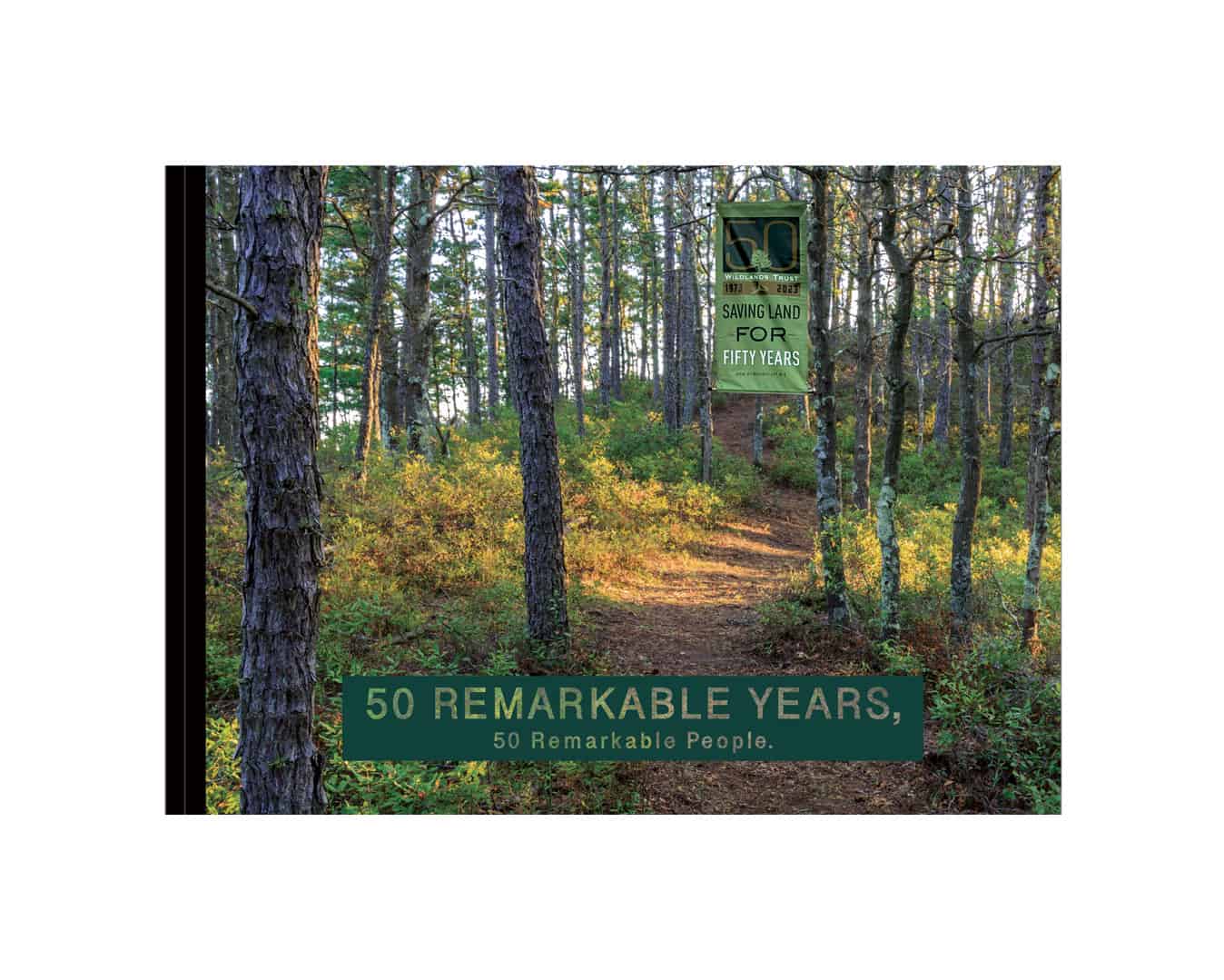
The year 2023 marked Wildlands Trust’s 50th Anniversary, a milestone made possible by the collective passion, sacrifice, and generosity of many people working toward the common goal of protecting the lands and natural resources that make Southeastern Massachusetts special. The book “50 Remarkable Years, 50 Remarkable People” pays tribute to the board leaders, volunteers, community partners, and landowners who have propelled the Wildlands Trust mission in significant ways.
The following article is an excerpt (abridged) from the book, “50 Remarkable Years, 50 Remarkable People.”

Doug Hart
In 2007, Wildlands Trust was just starting down the road to organizational maturity when Doug Hart became Chair of the Board. A strong, quiet leader, Doug held vast experience with larger non-profit boards, instantly earning him the respect of his peers. Guided by a true-north moral compass and strong business acumen, Doug took on the role of teaching the Wildlands board to do its work. And he never wavered. He consistently reminded board members of their roles as fiduciaries, fundraisers, and high-level strategists, while discouraging them from meddling in day-to-day operations, which he made clear was the job of the Wildlands president. Doug was often heard saying, “We need to make the right decision, not the easy decision,” driving home the moral and ethical responsibilities of land trust board members. After serving 12 years as board chair, Doug stepped down in 2019. Despite the pleas to stay, he felt it was the right thing to do for Wildlands Trust. He was the right person for the important job of nudging Wildlands out of the nest. When we fledged, Doug’s work was done.
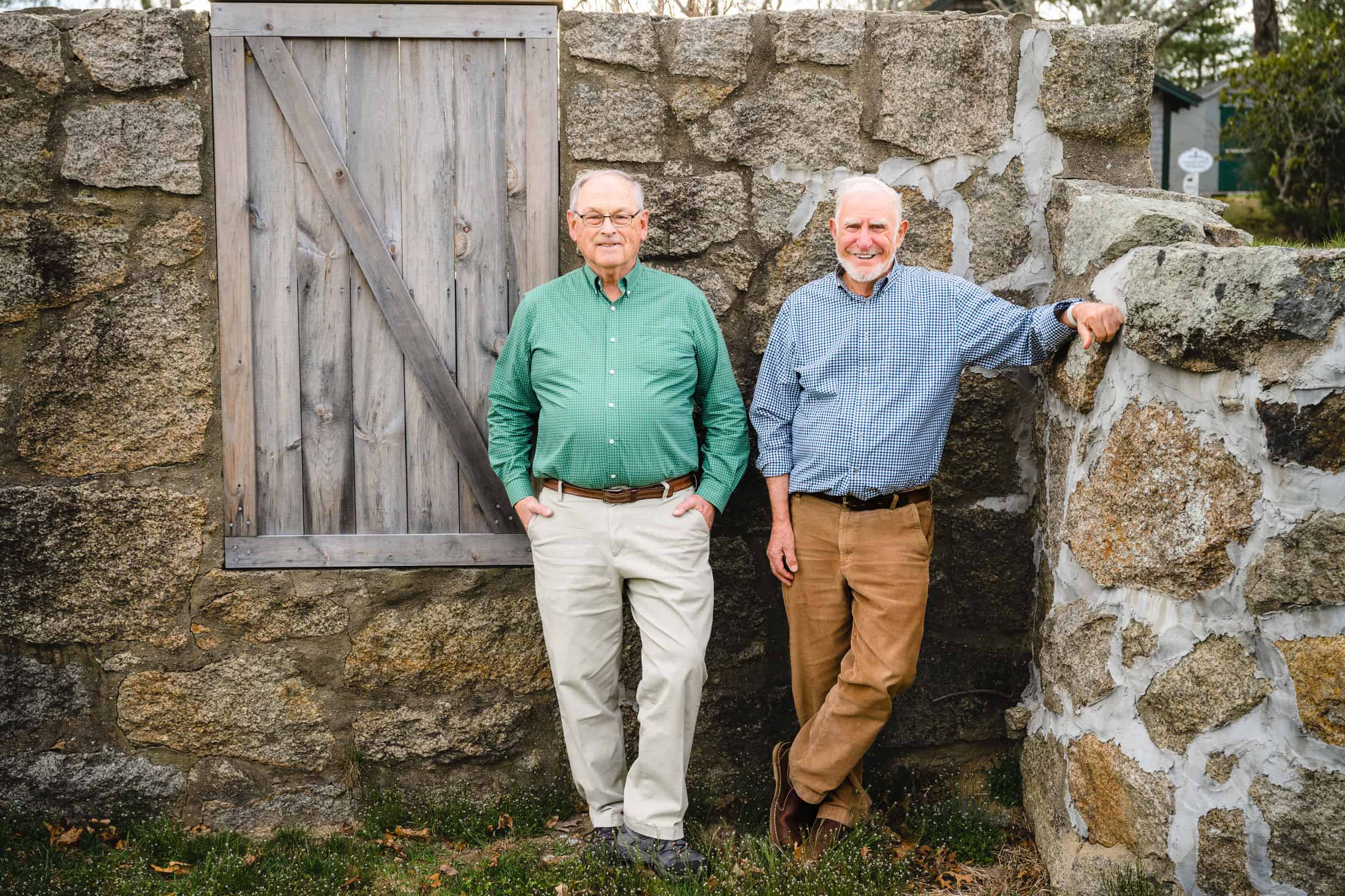
Wayne Petersen and Brian Harrington
The connection between birds and land is indisputable, so it should come as little surprise that many of the people involved in the genesis of Wildlands Trust were passionate birders. Brian Harrington was a budding ornithologist at the Manomet Bird Observatory when the idea of a regional land trust first sprouted.
“I remember a group of us sitting around Leona Asker’s kitchen table while she pitched her plan to start a land trust,” he says. Along with Asker, Betty Anderson, the president of Manomet, was a primary instigator of these conversations. “Within a few weeks, we had to move the meetings to the Plymouth Airport canteen because the group grew too big for Leona’s kitchen,” adds Mass Audubon’s Wayne Petersen, another young bird aficionado at the time. Brian and Wayne became world-class ornithologists, traveling the globe to study birds and protect their habitats. Yet neither lost focus on the importance of protecting their own backyard. In the decades following those modest 1973 meetings, their commitment to Wildlands Trust never wavered, leading to multiple terms as board members, committee members, and program leaders. Today, both serve on the Board of Directors, where they are respected by their peers for their important contributions around natural resources. Brian and Wayne also play key roles on the Lands Committee, which visits and assesses the conservation values of each parcel being considered for protection.
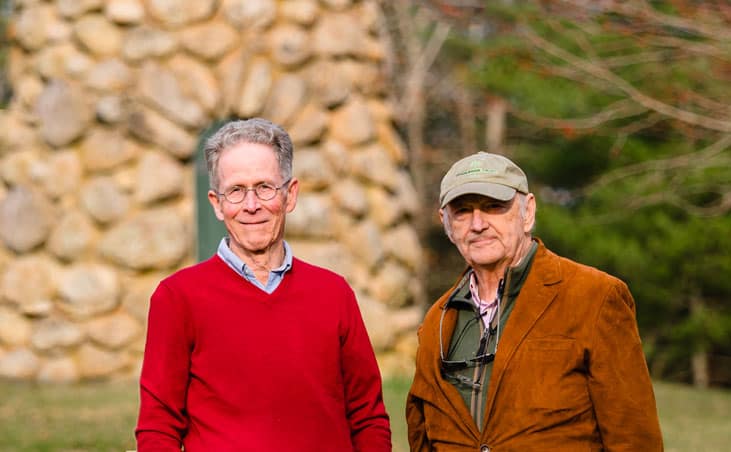
Sam Chapin and Howard Randall
The board thrives as a mixed table of farmers, accountants, biologists, lawyers, foresters, and entrepreneurs, all bound by a commitment to protecting land. For the past three decades, the task of managing this diverse group has fallen on the capable shoulders of the three most recent board chairs of Wildlands Trust, Sam Chapin, Howard Randall, and the previously featured Doug Hart. Yet the vast contributions of these individuals go far beyond encouraging all to speak and ensuring all are heard. Born and raised in Southeastern Massachusetts, Howard Randall’s connections with landowners are unsurpassed. A community leader and true champion of land protection, Howard made it his personal mission to introduce Wildlands to any and every person with important land holdings. Brockton Audubon Preserve, Great River Preserve, the Cortelli Preserves, and Striar Conservancy are just a few of the signature land protection projects that he brought to Wildlands Trust. Howard’s relationships and commitment have led to the protection of thousands of acres of invaluable land across the region. Sam Chapin spent his boyhood summers on the shores of Plymouth’s Long Pond, where he lives today. Sam, a career engineer, drove efforts to purchase Davis-Douglas Farm and establish it as the Trust’s new headquarters. As chair of the two working sub committees focused on fundraising and construction, Sam’s leadership of the Davis-Douglas Farm campaign opened one of the most important chapters in the evolution of Wildlands Trust.
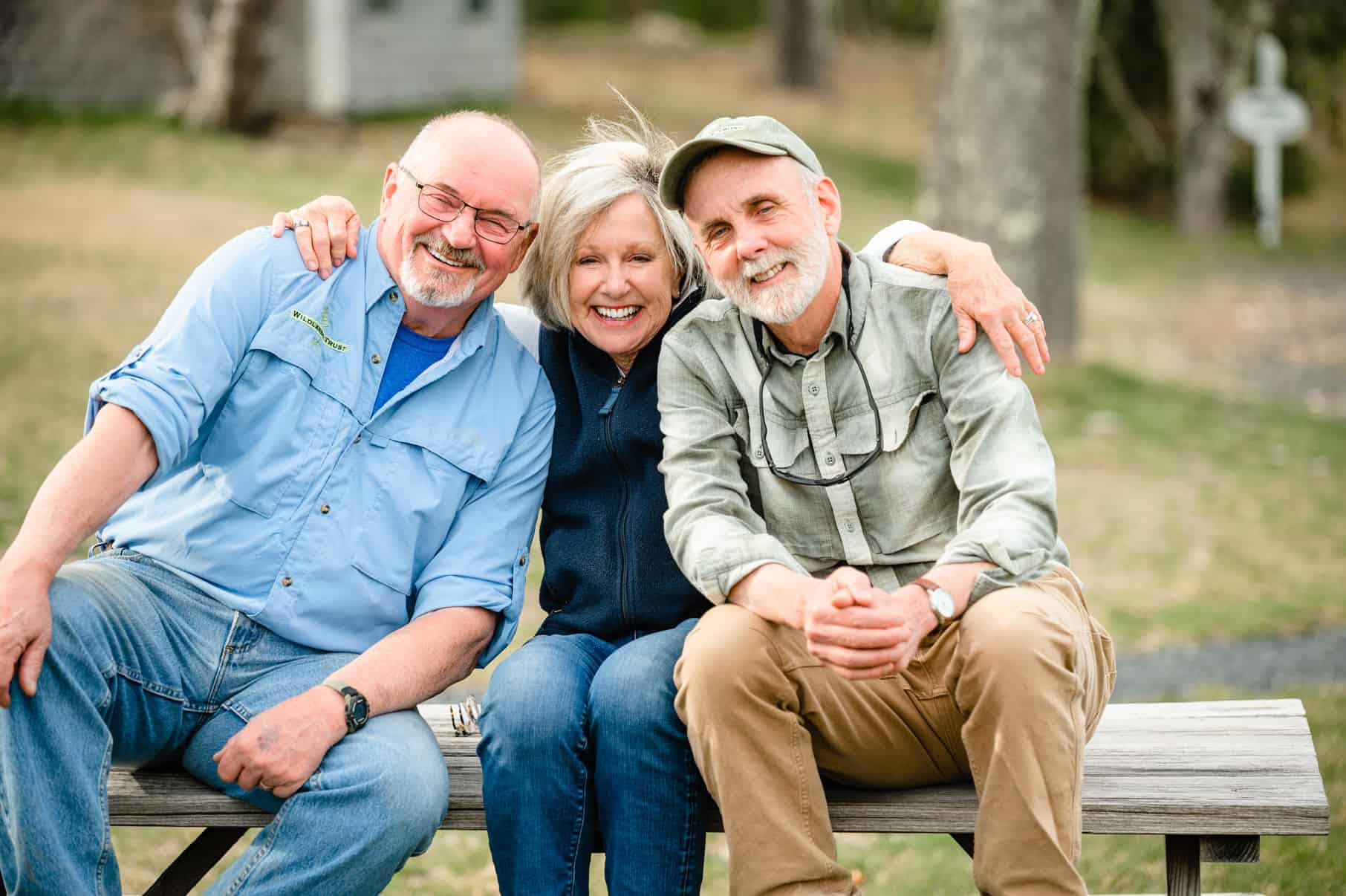
Skip Stuck, Marilynn Atterbury and Rob MacDonald
The customary practice in the non-profit sector is to measure volunteer impact by the number of hours served. However, the cumulative impact of Marilynn Atterbury, Skip Stuck, and Rob MacDonald on Wildlands Trust goes well beyond the extraordinary number of hours they work.
With the “Three Amigos,” it is more about the intangibles. It is their positive energy, reliability, leadership, creativity, and intellectual generosity that endears these three amazing individuals to the Wildlands staff. If you arrive at Davis-Douglas Farm at 8:00 a.m. on a beautiful spring morning, you may encounter a cheerful gardener tending the vibrant flower beds that she designed and built. This is Marilynn, a former horse farm manager, who tends the Davis-Douglas gardens as if they are her own. If you attend a guided hike, your leader is likely to be Skip Stuck. A retired social worker and non-profit manager, Skip has many talents, including teaching carpentry skills to our land stewards. Rob MacDonald, an IT professional, is the man to thank if you use the new Wildlands trail app featuring maps of our properties, or if you enjoy the new trail complex along the Indian Head River.
“These are the most special people we could ever have working with us,” says stewardship manager Owen Grey.

Phil Benjamin
Massachusetts is the 8th most heavily forested state in the country, with over 62 percent of land under forest cover. The public benefits provided by these forests are significant and include clean air, clean water, scenic values, wildlife habitat, recreational opportunities, and reducing the impact of climate change. Phil Benjamin sees the forests for the trees, and Southeastern Massachusetts for the forests. The preeminent forester has devoted his career to working with landowners to advance the health of our region’s woodlands. His dedication, knowledge, and good humor have endeared Phil to his vast base of private, commercial, and municipal clients. Never shy about his passion for our work, he has introduced many landowners to Wildlands Trust, resulting in exciting opportunities for us to permanently protect important forests. Phil is also a highly regarded member of the Wildlands Trust Lands Committee, which puts “boots on the ground” to assess the conservation value of each parcel we consider for protection. His expertise in reading landscapes and understanding forest ecology has been integral to our land protection work for the past three decades.
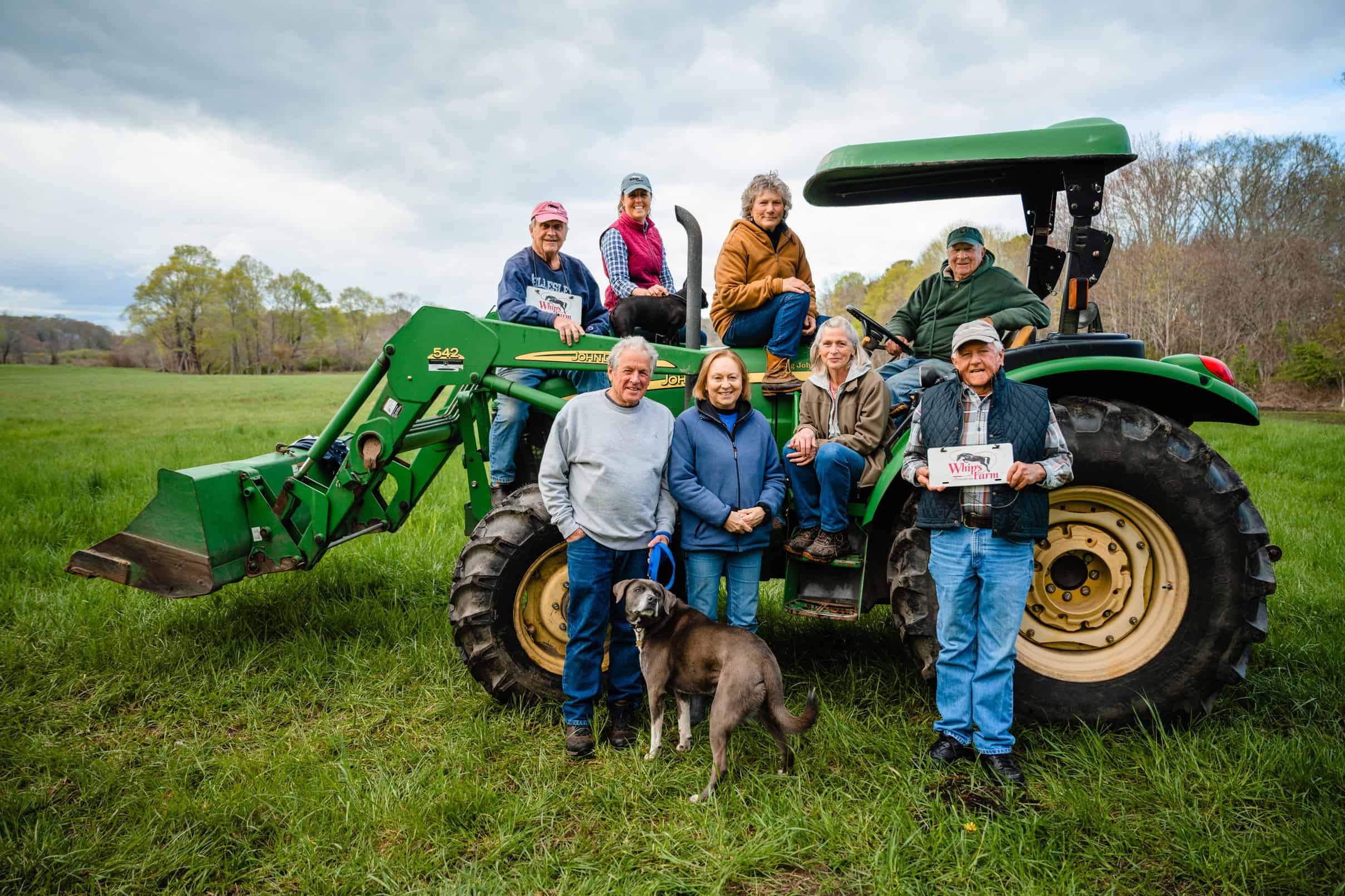
The Crew at Whip’s Farm
Our region has lost over 70 percent of its farms in the past 50 years as retiring farmers opt for soaring offers from commercial and residential developers for their land. Farms are integral to our communities’ economic, cultural, and ecological vitality. Our partnership with Whip’s Farm in the Chiltonville village of Plymouth exemplifies how a land trust and an operating farm can work together for the benefit of the community. Whip’s Farm is owned by Nuff Withington, who has lived on the land for most of his adult life. Passed down to Nuff by his grandfather, Sherman Whipple, these beautiful agricultural fields serve as the centerpiece of one of the most important agricultural corridors in the region, and certainly one of the most scenic neighborhoods in Plymouth. Wildlands Trust owns 60 acres of farmland adjacent to Whip’s Farm, which we license to farmers who produce hay, corn, and hops for local craft beer. We rely on the crew from Whip’s Farm for the hard work, expertise, and equipment they donate to ensure that our fields are productive and well-maintained. Thank you to the Whip’s Farm crew, who do so much for Wildlands Trust: Tommy, Stephanie, Kathy, Jimmy, Nuff, Heidi, Ann, Jock, and Willa, the farm dog.
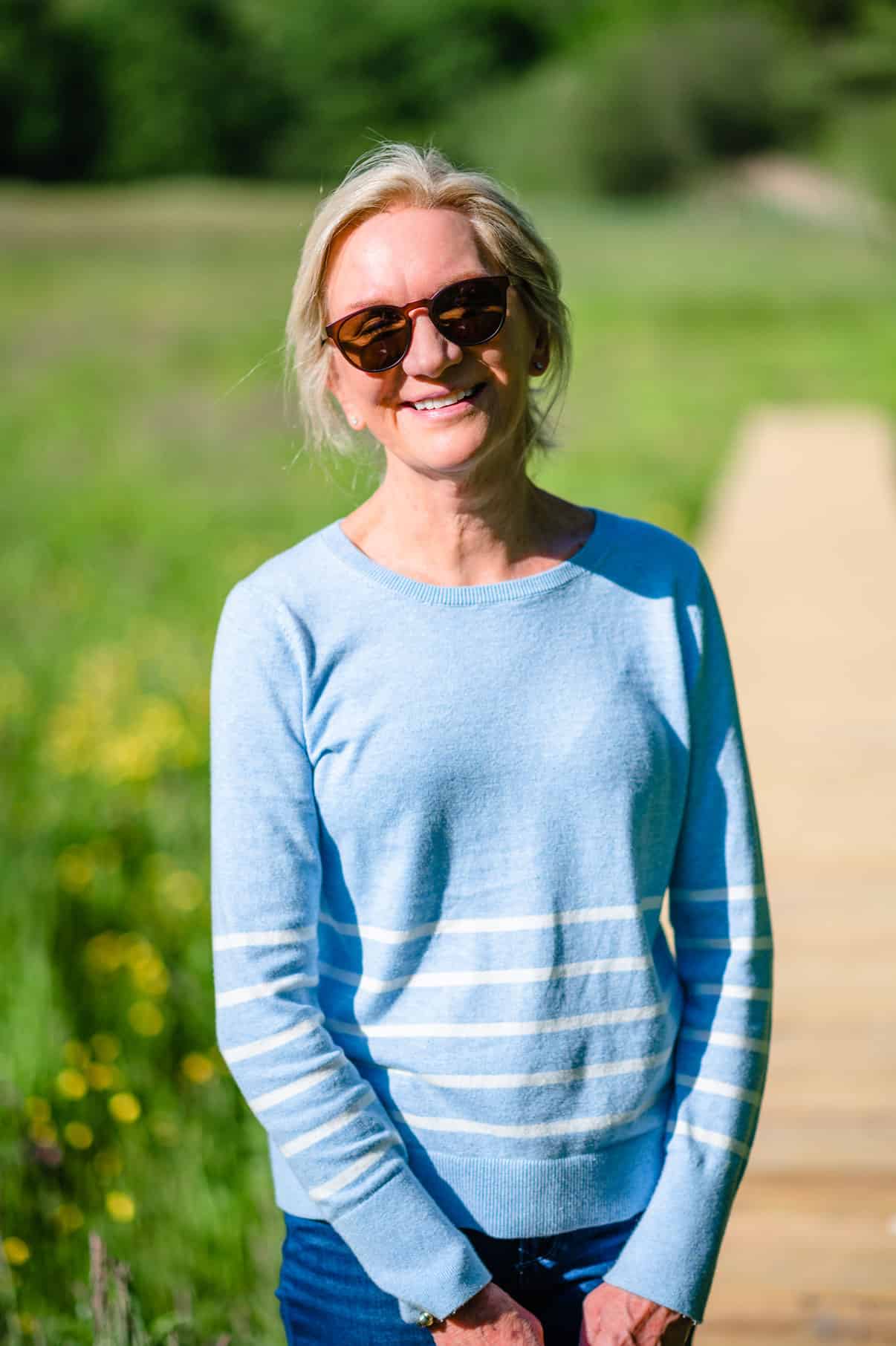
Sue Caron
For about the entire half-century of Wildlands’ operation, the town of Marshfield has been a leader in locally driven land preservation. Since 2005, two extraordinary town volunteers have maintained that distinguished history: Susan Caron and the late Karen O’Donnell. Susan and Karen alternated stints as Chair of the Open Space Committee, with Susan serving from 2005 to 2011 and 2021 to the present. Karen assumed the Chair in 2011 and served until 2021, when health issues forced her to step down. She continued to serve on the committee until her untimely passing in the fall of 2022.
Under Susan and Karen’s leadership, the Marshfield Open Space Committee has completed dozens of projects, preserving a wide array of landscapes and habitats across a town that includes extensive coastline, much of the North and South River corridors, and hilly upland terrain. The town placed Conservation Restrictions with Wildlands Trust on each acquired property. Wildlands has relied heavily on Susan and Karen’s guidance and local knowledge. Beyond their project and procedural expertise, they have been a joy to work with—always maintaining good humor in the face of whatever challenges or deadlines arise.

Herb Emilson
The 165-acre Willow Brook Farm in Pembroke is among the most diverse natural areas in Southeastern Massachusetts. The property is exceptionally productive for wildlife, thanks in part to its conservation of a freshwater tidal marsh, a habitat of state and global significance. The opportunity to protect this land was presented to Wildlands Trust in 1995 by beloved South Shore philanthropists Herb and Paulie Emilson.
“Our philanthropy was always about helping people, and one day Paulie said she wanted to do something for the environment,” Herb recalls. “We wanted to do something special.” They did just that. The Emilsons contributed the necessary funds not only to secure Willow Brook Farm, but also to establish it as one of the most important passive recreation sites in Wildlands’ portfolio. Now, the preserve hosts upwards of 20,000 visitors a year. After the Willow Brook project, the Emilsons’ interest in land protection only continued to grow, resulting in contributions that helped protect other iconic parcels. Driven by a passion for helping their community, Herb and Paulie Emilson are giants of South Shore philanthropy. Their generosity has built hospital wings, art centers, YMCAs, and Boys and Girls Clubs. It has also helped dozens of organizations, including Wildlands Trust, accomplish their missions.
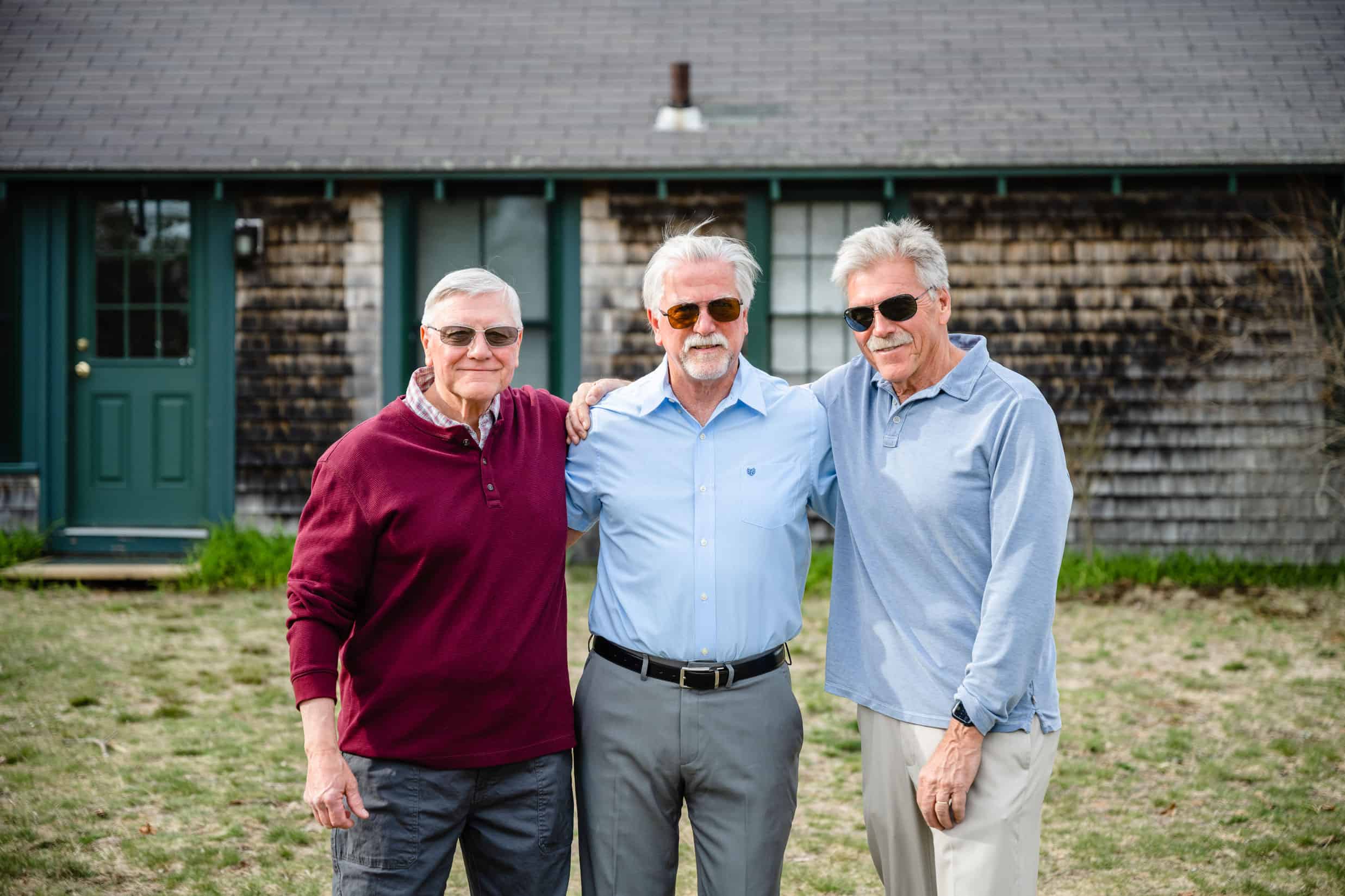
Bongiovani Brothers
A common challenge of land protection is working with siblings tasked with determining the future of family land. Conservation deals frequently stall or even fall apart because of the divergent ideas and expectations of the next generation. The Bongiovanni brothers eased our apprehension around this issue in 2010 when Wildlands began discussions with them about acquiring their Plymouth farmland for our new headquarters. Shortly after World War II, the property we now call Davis-Douglas Farm was given to their grandfather, Percy Douglas, by the children of his employer, Howland Davis. Two generations subsequently grew up on the farm; Percy raised his seven children, and then his daughter Barbara raised three sons. With a keen sense of what this iconic property meant to their family and the broader community, David, Rob, and John Bongiovanni listened carefully when Wildlands broached the idea of protecting the land and converting the old farmhouse into offices. Then, something remarkable happened: within one week, Wildlands and the Bongiovanni brothers reached a handshake agreement on a bargain sale of the property. In exchange, the brothers would retain naming rights, with which they chose to honor the relationship between Howland Davis and Percy Douglas, hence creating Davis-Douglas Farm. The Bongiovanni brothers, and the grace with which they conducted business during the farm transfer,will always be an important part of the Wildlands story.

David DeGhetto
Like many organizations during the COVID-19 pandemic, Wildlands Trust had to rethink its practices for a new world that discouraged people from being together. It was a time when several important projects needed to close quickly, including Sylvester Field, a high-priority land protection project in the town of Hanover. With an engaged and willing seller, the challenges became all about fundraising. How could we close a $500,000 fundraising gap when we could not visit potential donors? Would people contribute to a project site unseen? David DeGhetto, a former Wildlands board member and longtime supporter, understood the predicament. With a passion for projects that bring together land and historic preservation objectives, David was drawn to Sylvester Field and offered his assistance. Working with Wildlands, he set up a generous matching fund that established the momentum and enthusiasm required for a local fundraising campaign. The idea of having their gifts matched by the fund compelled over 150 new donors to step forward and provide the support needed to save these important historic fields. David DeGhetto’s true passion is finding ways to repurpose historic structures slated for demolition, but protecting historic lands is a close second. We celebrate David as a man committed to safeguarding the future by protecting what is truly special about the past.

Charlotte Russell
Big ideas often start with a small step, but that step is often clouded in uncertainty. In 1973, Mary Emery took a chance.
“She gathered us together and asked me and my brothers if we would agree to donate the property for conservation,” said Mary’s daughter and Wildlands Trustee Emeritus, Charlotte Emery Russell. With the concept of a regional land trust barely off the ground, Mary Emery and her children made a bold decision that would turn out to have enormous implications. They donated the family’s beautiful 126-acre wooded parcel in South Plymouth to the fledgling Plymouth County Wildlands Trust. Emery Preserve became Wildlands’ first property and the eventual centerpiece of the Davis-Douglas Conservation Area. This small step paved the way for others to follow, with each new parcel of protected land building momentum toward the big idea: a strong regional land trust to protect the unique lands and natural resources of Southeastern Massachusetts. The Emery family is considered the “First Family” of Wildlands Trust. Charlotte Emery Russell, a stalwart conservationist, carries on the family’s commitment to Wildlands Trust through her many years of board leadership, including her role in raising the funds for Davis-Douglas Farm, Wildlands’ current headquarters. Thank you to the Emery family for taking a chance on Wildlands Trust, a big idea that today protects over 350 properties in 55 towns across the region. And it all started with a small step.
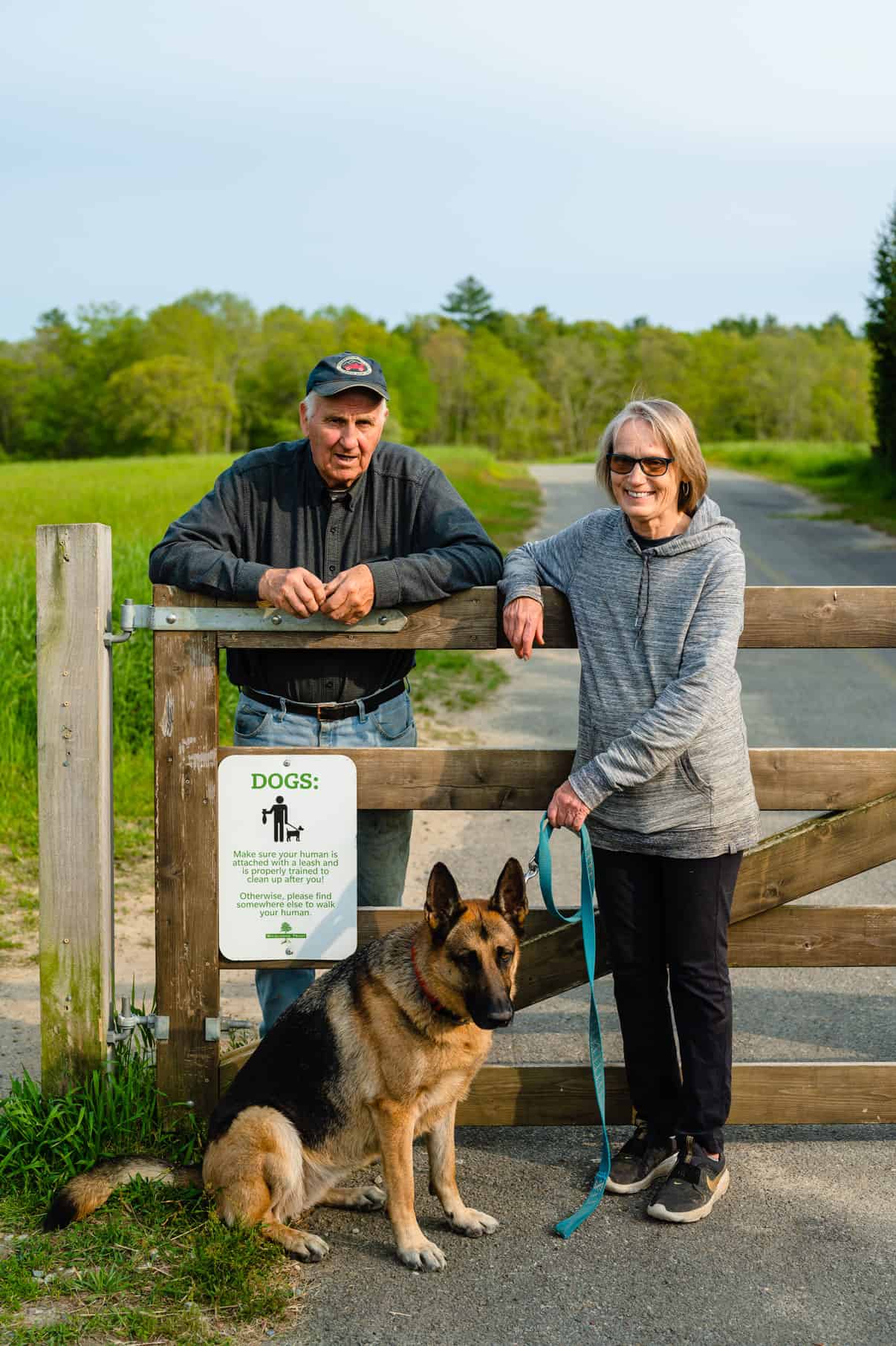
Lehtola Family
It is not unusual for land protection projects to take years, or even decades, to complete. Hurdles are to be expected. Generally, the bigger the parcel, the higher the hurdles, and the longer the project takes. There are exceptions, however. When asked why the project to protect his 250-acre parcel on the Taunton River proceeded so smoothly, Peter Lehtola is quick to answer. “I had an angel sitting on my shoulder,” he says. “I promised my mother I would make sure this land was never developed, and that was a promise I intended to keep.” The deal to protect this stunningly beautiful parcel came together in a single session at Peter and Rita Lehtola’s kitchen table, where the Lehtolas sat with staff from Wildlands Trust and the Mass Department of Fish & Game, along with Maggie, their napping German shepherd. We presented our appraisal and, without hesitation, Peter called it a deal. For the record, it never happens like this. Today, ownership of Great River Preserve is shared by Wildlands and the Department of Fish and Game. The property is a conservation gem. It boasts over 1.5 miles of frontage on the Taunton River, expansive open fields for ground-nesting birds, and beautiful woodland walking trails. Peter and Rita are the best neighbors we could ever ask for. They are always there to lend a helping hand (or a piece of needed equipment), yet remain completely respectful of the property’s new ownership.
